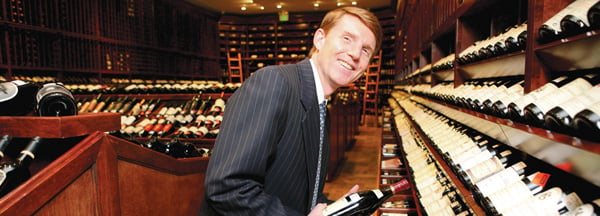Wine Time: A Firm Finds Common Interests on the Vine

Photo of Stan Gibson by Jonah Light
Listen in at a social gathering of attorneys from the firm of Jeffer Mangels Butler & Mitchell and you’re just as likely to hear them evaluating a glass of Burgundy as you are to hear them talking shop. Wine is a passion for a devoted segment of this California firm, which has about 125 attorneys in three offices. And though it was not planned as a work-life initiative, this shared pursuit has conferred similar advantages: There’s a palpable camaraderie, and work and life often weave easily and naturally.
“I think anything you can do to create other avenues of interest and connection besides just your profession and making money, which tend to dominate too much of the discussion, gives you a second level of things to talk about,” says founding partner Bruce Jeffer, 69, a longtime wine connoisseur.
One partner estimates that at least 25 to 30 percent of the firm’s attorneys have embraced the study of wine, with the more experienced connoisseurs mentoring novices. They bond over monthly “wine and schmooze” events and share their niches of knowledge: One attorney loves Burgundy, another Rhône. One partner can describe European vineyards he’s never visited. Several attorneys are building private collections, often bringing favorites to share at firm events. Partner Stan Gibson has about 4,000 bottles, and Jeffer has a collection of 20,000—down from a high of 35,000.
“People always feel more intensely connected and loyal to a place when more of who they are is getting honored,” says Debby Stone, a certified career coach from Atlanta who works with lawyers and law firms. “If you have that shared passion with other people you work with, it creates a stronger bond. It reaps benefits for the individual, but it really reaps tremendous benefits for the firm.”
Increased productivity is among them, according to Stone.
“I think a lot of times there’s a mindset that if people have interests outside, that will sap productivity because they will want to go and do this other thing that isn’t practicing law and billing hours,” Stone says. “Actually, the opposite is true. When you increase feelings of connection and shared passion … productivity actually increases. I will have far more interest in working hard and having my partner’s back if we share things that are more than just work.”
A SEDUCTIVE SPILL
Of course, Jeffer didn’t set out to build a firm of oenophiles. He just loved wine and food, and that enthusiasm spilled into his professional life.
“Whatever you’re passionate about, those are the people you attract,” he says. “It also became kind of an entrée for some. We wound up with some wonderful partners who didn’t know wine, but who we seduced.” It’s also helped build relationships with clients.
“Some clients also express an interest in wine, so you’ll go out to dinner, and it opens [conversation] up,” says Walter Gouldsbury III, 33, an associate in the firm’s San Francisco office. “It shows a different side of you, not just work. You can share a common interest with clients.”
Gibson, 44, tells a story about a business relationship he had with a general counsel that grew over years of shared meals and glasses of wine. That general counsel eventually joined Jeffer Mangels, and he and Gibson are close friends.
But just because Jeffer Mangels’ wine culture emerged fairly naturally doesn’t mean there aren’t lessons for other firms, Stone says.
“When I work with firms to talk about mentoring new attorneys, one of the things I suggest is that they try to get a bigger picture of who this person is outside of the practice,” she says. “The more the firm knows about what people’s passions are and where they are plugged in, the more that can be leveraged for business development.”
Becky Beaupre Gillespie is a Chicago-based journalist who writes on work-life balance issues. Hollee Schwartz Temple directs the legal writing program at West Virginia University College of Law.



